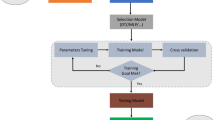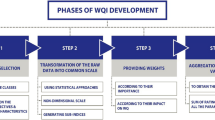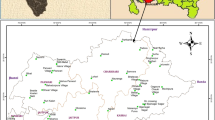Abstract
Machine learning algorithms have proven useful in the estimation, classification, and prediction of water quality parameters. Similarly, indexical modeling has enhanced the evaluation and summarization of water quality. In Nigeria, works that have incorporated machine learning modeling in water quality analysis are scarce. Although studies across the globe have utilized overall index of pollution (OIP) and water quality index (WQI), works that have simulated and predicted them using machine learning algorithms seem to be scarce. Studies have not simulated nor predicted OIP. In this paper, several physicochemical parameters were analyzed and used for groundwater quality modeling in southeastern Nigeria based on integrated data-intelligent algorithms. Standard methods were followed in all the analysis and modeling performed in this work. OIP and WQI were computed, and their results revealed that 80% of the groundwater resources are suitable for drinking whereas 20% are highly polluted and unsuitable. Pearson’s correlation analysis and R-mode hierarchical clustering revealed the possible sources of contamination. Meanwhile, agglomerative Q-mode hierarchical clustering and K-means (partitional) clustering were used to show the spatial demarcations of water quality in the area. Both clustering algorithms identified two main water quality classes—the suitable and unsuitable classes. Furthermore, multiple linear regression (MLR) model and multilayer perceptron neural networks (MLP-NN) were used for the estimation and prediction of the water quality indices. With low modeling errors, both MLR and MLP-NN showed very strong predictions, as their determination coefficient ranged between 0.999 and 1.000. However, MLR slightly outperformed the MLP-NN in the prediction of OIP. The findings of this paper would enhance sustainable water management in the study region and also contribute great insights to the national and global water quality prediction literatures.











Similar content being viewed by others
Data availability
Not applicable.
References
Abba SI, Hadi SJ, Sammen SS, Salih SQ, Abdulkadir R, Pham Q, Yaseen ZM (2020a) Evolutionary computational intelligence algorithm coupled with self-tuning predictive model for water quality index determination. J Hydrol. https://doi.org/10.1016/j.jhydrol.2020.124974
Abba SI, Pham QB, Saini G, Linh NTT, Ahmed AN, Mohajane M, Khaledian M, Abdulkadir RA, Bach Q (2020b) Implementation of data intelligence models coupled with ensemble machine learning for prediction of water quality index. Environ Sci Pollut Res. https://doi.org/10.1007/s11356-020-09689-x
Abed BS, Farhan AA-R, Ismail AH, Al Aani S (2021) Water quality index toward a reliable assessment for water supply uses: a novel approach. Int J Environ Sci Technol. https://doi.org/10.1007/s13762-021-03338-7
Adimalla N, Qian H (2019) Groundwater quality evaluation using water quality index (WQI) for drinking purposes and human health risk (HHR) assessment in an agricultural region of Nanganur, south India. Ecotox Environ Saf 176:153–161. https://doi.org/10.1016/j.ecoenv.2019.03.066
Ahada CPS, Suthar S (2017) Assessment of human health risk associated with high groundwater fluoride intake in southern districts of Punjab. Expo Health, India. https://doi.org/10.1007/s12403-017-0268-4
Akpoborie IA, Nfor BN, Etobro AAI, Odagwe S (2011) Aspects of the geology and groundwater conditions of Asaba. Nigeria Arch Appl Sci Res 3(2):537–550
Ansari JA, Umar R (2019) Evaluation of hydrogeochemical characteristics and groundwater quality in the quaternary aquifers of Unnao District, Uttar Pradesh, India. HydroResearch. https://doi.org/10.1016/j.hydres.2019.01.001
APHA (2005) Standard methods for the examination of water and wastewater, 21st edn. American Public Health Association, Washington DC
Arua I (1986) Paleoenvironment of Eocene deposits in the Afikpo syncline, southern Nigeria. J Afr Earth Sci 5:279–284
Arya S, Subramani T, Vennila G, Roy PD (2020) Groundwater vulnerability to pollution in the semi-arid Vattamalaikarai river basin of south India thorough DRASTIC index evaluation. Geochemistry. https://doi.org/10.1016/j.chemer.2020.125635
Asadisaghandi J, Tahmasebi P (2011) Comparative evaluation of backpropagation neural network learning algorithms and empirical correlations for prediction of oil PVT properties in Iran oilfields. J Pet Sci Eng 78(2):464–475. https://doi.org/10.1016/j.petrol.2011.06.024
Baysal A, Ozbek N, Soleyman A (2013) Determination of trace metals in wastewater and their removal process, Chapter 7. https://doi.org/10.5772/52025
Bhakar P, Singh AP (2018) Groundwater quality assessment in a hyper-arid region of Rajasthan. Nat Resour Res, India. https://doi.org/10.1007/s11053-018-9405-4
Celestino AEM, Cruz DAM, Sánchez EMO, Reyes FG, Soto DV (2018) Groundwater quality assessment: an improved approach to k-means clustering, principal component analysis and spatial analysis: a case study. Water 10:437. https://doi.org/10.3390/w10040437
Chen J, Wu H, Qian H (2016) Groundwater nitrate contamination and associated health risk for the rural communities in an agricultural area of Ningxia, northwest China. Expo Health 8(3):349–359. https://doi.org/10.1007/s12403-016-0208-8
Chen W, Liu W (2015) Water quality modeling in reservoirs using multivariate linear regression and two neural network models. Adv Artif Neural Syst. https://doi.org/10.1155/2015/521721
Cong LW, Bahadori A, Zhang J, Ahmad Z (2019) Prediction of Water Quality Index (WQI) using support vector machine (SVM) and least square-support vector machine (LS-SVM). Int J River Basin Manag, 1-15https://doi.org/10.1080/15715124.2019.1628030
Dubrovsky NM, Burow KR, Clark GM, Gronberg JM, Hamilton PA, Hitt KJ, et al. (2010) The quality of our nations water: nutrients in the nation’s streams and groundwater, 1992–2004. U.S. Geological Survey Circular 1350, Virginia
Egbueri JC (2018) Assessment of the quality of groundwaters proximal to dumpsites in Awka and Nnewi metropolises: a comparative approach. Int J Energy Water Res. https://doi.org/10.1007/s42108-018-0004-1
Egbueri JC (2019) Evaluation and characterization of the groundwater quality and hydro-geochemistry of Ogbaru farming district in southeastern Nigeria. SN Appl Sci. https://doi.org/10.1007/s42452-019-0853-1
Egbueri JC (2020a) Groundwater quality assessment using pollution index of groundwater (PIG), ecological risk index (ERI) and hierarchical cluster analysis (HCA): a case study. Groundw Sustain Dev 10:100292. https://doi.org/10.1016/j.gsd.2019.100292
Egbueri JC (2020b) Heavy metals pollution source identification and probabilistic health risk assessment of shallow groundwater in Onitsha. Nigeria Anal Lett 53(10):1620–1638. https://doi.org/10.1080/00032719.2020.1712606
Egbueri JC (2021) Prediction modeling of potentially toxic elements’ hydrogeopollution using an integrated Q-mode HCs and ANNs machine learning approach in SE Nigeria. Environ Sci Pollut Res. https://doi.org/10.1007/s11356-021-13678-z
Egbueri JC, Ezugwu CK, Ameh PD, Unigwe CO, Ayejoto DA (2020) Appraising drinking water quality in Ikem rural area (Nigeria) based on chemometrics and multiple indexical methods. Environ Monit Assess 192(5):308. https://doi.org/10.1007/s10661-020-08277-3
Egbueri JC, Ezugwu CK, Unigwe CO, Onwuka OS, Onyemesili OC, Mgbenu CN (2021) Multidimensional analysis of the contamination status, corrosivity and hydrogeochemistry of groundwater from parts of the Anambra Basin. Nigeria Anal Lett 54(13):2126–2156. https://doi.org/10.1080/00032719.2020.1843049
Egbueri JC, Mgbenu CN, Chukwu CN (2019) Investigating the hydrogeochemical processes and quality of water resources in Ojoto and environs using integrated classical methods. Model Earth Syst Environ 5(4):1443–1461. https://doi.org/10.1007/s40808-019-00613-y
Egbueri JC, Unigwe CO (2019) An integrated indexical investigation of selected heavy metals in drinking water resources from a coastal plain aquifer in Nigeria. SN Applied Sciences 1(11):1422. https://doi.org/10.1007/s42452-019-1489-x
Elkiran G, Nourani V, Abba SI (2019) Multi-step ahead modelling of river water quality parameters using ensemble artificial intelligence-based approach. J Hydrol 577:123962. https://doi.org/10.1016/j.jhydrol.2019.123962
Enyigwe MT, Onwuka OS, Egbueri JC (2021) Geochemical distribution, statistical and health risk assessment of toxic elements in groundwater from a typical mining district in Nigeria. Environ Forensics. https://doi.org/10.1080/15275922.2021.1907822
Fatemeh B, Ehteram M, Sammen SS, Panahi F, Othman F, EL-Shafie A, (2020) Estimation of total dissolved solids (TDS) using new hybrid machine learning models. J Hydrol 587:124989. https://doi.org/10.1016/j.jhydrol.2020.124989
Gaya MS, Abba SI, Abdu AM, Tukur AI, Saleh AM, Esmaili P, Wahab NA (2020) Estimation of water quality index using artificial intelligence approaches and multi-linear regression. IAES Int J Artif Intell 9(1):126–134. https://doi.org/10.11591/ijai.v9.i1.pp126-134
Gazzaz NM, Yusoff MK, Aris AZ, Juahir H, Ramli MF (2012) Artificial neural network modeling of the water quality index for Kinta River (Malaysia) using water quality variables as predictors. Mar Pollut Bull 64(11):2409–2420. https://doi.org/10.1016/j.marpolbul.2012.08.005
Hamed MAR (2019) Application of surface water quality classification models using principal components analysis and cluster analysis. J Geosci Environ Protect 7:26–41. https://doi.org/10.4236/gep.2019.76003
Heddam S, Kisi O (2017) Extreme learning machines: a new approach for modeling dissolved oxygen (DO) concentration with and without water quality variables as predictors. Environ Sci Pollut Res 24:16702–16724. https://doi.org/10.1007/s11356-017-9283-z
Horton RK (1965) An index number system for rating water quality. J Water Pollut Control Fed 37(3):300–306
Jafari H, Taher Rajaee, Kisi O (2020) Improved water quality prediction with hybrid wavelet-genetic programming model and Shannon entropy. Nat Resour Res 29(6):3819–3840. https://doi.org/10.1007/s11053-020-09702-7
Jalali M (2012) Hydrochemical characteristics and sodification of groundwater in the Shirin Sou, Hamedan. Western Iran Nat Resour Res 21(1):61–73. https://doi.org/10.1007/s11053-011-9152-2
Juahir H, Zain SM, Toriman ME et al (2004) Application of artificial neural network models for predicting water quality index. Malaysian J Civ Eng 16:42–55
Kadam AK, Wagh VM, Muley AA, Umrikar BN, Sankhua RN (2019) Prediction of water quality index using artificial neural network and multiple linear regression modelling approach in Shivganga River basin. Model Earth Syst Environ, India. https://doi.org/10.1007/s40808-019-00581-3
Karakus CB (2019) Evaluation of groundwater quality in Sivas province (Turkey) using water quality index and GIS-based analytic hierarchy process. Int J Environ Health Res 29(5):500–519
Karanth KR (1987) Groundwater assessment: development and management. Tata McGraw-Hill Education, New York
Karunanidhi D, Aravinthasamy P, Subramani T, Setia R (2021) Groundwater suitability estimation for sustainable drinking water supply and food production in a semi-urban area of south India: a special focus on risk evaluation for making healthy society. Sustain Cities Soc 73:103077. https://doi.org/10.1016/j.scs.2021.103077
Kogbe CA (1976) Paleographic history of Nigeria from Albian Times. In: Kogbe CA (ed) Geology of Nigeria. Elizabethan Publishers, Lagos
Kumar SK, Babu SH, Rao PE, Selvakumar S, Thivya C, Muralidharan S et al (2017) Evaluation of water quality and hydro geochemistry of surface and groundwater, Tiruvallur District, Tamil Nadu. India Appl Water Sci 7(5):2533–2544. https://doi.org/10.1007/s13201-016-0447-7
Li L, Jiang P, Xu H, Lin G, Guo D, Wu H (2019) Water quality prediction based on recurrent neural network and improved evidence theory: a case study of Qiantang River, China. Environ Sci Pollut Res 26:19879–19896. https://doi.org/10.1007/s11356-019-05116-y
Li P, Qian H, Wu J (2010) Groundwater quality assessment based on improved water quality index in Pengyang County, Ningxia, North west China. J Chem 7:209–216
Li P, Wu J (2019) Drinking water quality and public health. Expo Health 11:73–79. https://doi.org/10.1007/s12403-019-00299-8
Liu M, Lu J (2014) Support vector machine—an alternative to artificial neuron network for water quality forecasting in an agricultural nonpoint source polluted river? Environ Sci Pollut Res 21(18):11036–11053. https://doi.org/10.1007/s11356-014-3046-x
Liu M, Wang M, Wang J, Li D (2013) Comparison of random forest, support vector machine and back propagation neural network for electronic tongue data classification: application to the recognition of orange beverage and Chinese vinegar. Sensors Actuators B Chem 177:970–980. https://doi.org/10.1016/j.snb.2012.11.071
Madison RJ, Brunett JO (1985) Overview of the occurrence of nitrate in ground water of the United States, in USGS National Water Summary 1984: U.S. Geol Survey Water-Supply Paper 2275:93–105
Marghade D, Malpe DB, Subba Rao N (2015) Identification of controlling processes of groundwater quality in a developing urban area using principal component analysis. Environ Earth Sci 74(7):5919–5933. https://doi.org/10.1007/s12665-015-4616-z
Mariethoz G, Gómez-Hernández JJ (2021) Editorial: machine learning for water resources. Front Artif Intell 4:699862. https://doi.org/10.3389/frai.2021.699862
Mencio A, Mas-Pla J, Otero N, Regàs O, Boy-Roura M, Puig R et al (2016) Nitrate pollution of groundwater; all right, but nothing else? Sci Total Environ 539:241–251. https://doi.org/10.1016/j.scitotenv.2015.08.151
Mohammadpour R, Shaharuddin S, Zakaria N, Ghani A, Vakili M, Chan N (2016) Prediction of water quality index in free surface constructed wetlands. Environ Earth Sci 75:1–12. https://doi.org/10.1007/s12665-015-4905-6
Najah A, El-Shafie A, Karim OA, El-Shafie AH (2014) Performance of ANFIS versus MLP-NN dissolved oxygen prediction models in water quality monitoring. Environ Sci Pollut Res 21:1658–1670. https://doi.org/10.1007/s11356-013-2048-4
Nfor B, Olobaniyi S, Ogala J (2007) Extent and distribution of groundwater resources in parts of Anambra State, Southeastern, Nigeria. J ApplSci Environ Manag 11(2). https://doi.org/10.4314/jasem.v11i2.55050
Nourani V, Khanghah TR, Sayyadi M et al (2013) Application of the artificial neural network to monitor the quality of treated water. Int J Manag Inf Technol 2(2):38–45. https://doi.org/10.24297/ijmit.v3i1.1388
Nwachukwu SO (1972) The tectonic evolution of the southern portion of the Benue Trough, Nigeria. Geol Mag 109:411–419
Nwajide CS (2013) Geology of Nigeria’s sedimentary basins. CSS Press, Lagos
Okoro EI, Egboka BCE, Anike OL, Enekwechi EK (2010a) Evaluation of groundwater potentials in parts of the Escarpment area of southeastern Nigeria. Int J Geomat Geosci 1(3):544–551
Okoro EI, Egboka BCE, Onwuemesi AG (2010b) Evaluation of the aquifer characteristics of the Nanka Sand using hydrogeological method in combination with vertical electric sounding (VES). J Appl Sci Environ Manag 14(2):5–9
Ouma YO, Okuku CO, Njau EN (2020) Use of artificial neural networks and multiple linear regression model for the prediction of dissolved oxygen in rivers: case study of hydrographic Basin of River Nyando, Kenya. Complexity, https://doi.org/10.1155/2020/9570789
Pham QC, Mohammadpour R, Linh NTT, Mohajane M, Pourjasem A, Sammen SS, Anh DT, Nam VT (2020) Application of soft computing to predict water quality in wetland. Environ Sci Pollut Res. https://doi.org/10.1007/s11356-020-10344-8
Reyment RA (1965) Aspects of the geology of Nigeria: the stratigraphy of the cretaceous and Cenozoic deposits. Ibadan University Press, Ibadan
Sahu P (2019) Fluoride pollution in groundwater. In: Sahu P (ed) Groundwater development and management. Springer, Cham, pp 329–350
Salati S, Moore F (2010) Assessment of heavy metal concentration in the Khoshk River water and sediment, Shiraz, Southwest Iran. Environ Monit Assess. https://doi.org/10.1007/s10661-009-0920-y
Sargaonkar A, Deshpande V (2003) Development of an overall index of pollution for surface water based on a general classification scheme in Indian context. Environ Monit Assess 89:43–67
Singaraja C, Chidambaram S, Srinivasamoorthy K, Anandhan P, Selvam S (2015) A study on assessment of credible sources of heavy metal pollution vulnerability in groundwater of Thoothukudi Districts, Tamilnadu, India. Water Qual Expo Health. https://doi.org/10.1007/s12403-015-0162-x
Singh CK, Kumar A, Shashtri S, Kumar A, Kumar P, Mallick J (2017) Multivariate statistical analysis and geochemical modeling for geochemical assessment of groundwater of Delhi, India. J Geochem Explor 175:59–71. https://doi.org/10.1016/j.gexplo.2017.01.001
Solangi GS, Siyal AA, Babar MM, Siyal P (2019) Groundwater quality evaluation using the water quality index (WQI), the synthetic pollution index (SPI), and geospatial tools: a case study of Sujawal district, Pakistan. Hum Ecol Risk Assess Int J. https://doi.org/10.1080/10807039.2019.1588099
SON (2015) Nigerian standard for drinking water quality - NIS-554–2015 (pp. 1–28). Standard Organization of Nigeria, Abuja
Subba Rao N (2012) PIG: a numerical index for dissemination of groundwater contamination zones. Hydrol Process 26:3344–3350
Sureshjani MK, Amanipoor H, Battaleb-Looie S (2020) The effects of industrial wastewater on groundwater quality of the Boroujen Aquifer. Southwest Iran Nat Resour Res 29(6):3719–3741. https://doi.org/10.1007/s11053-020-09665-9
Townsend MA, Young DP (2000) Assessment of nitrate–nitrogen distribution in Kansas groundwater, 1990–1998. Nat Resour Res 9(2):125–134
Ukah BU, Ameh PD, Egbueri JC, Unigwe CO, Ubido OE (2020) Impact of effluent-derived heavy metals on the groundwater quality in Ajao industrial area, Nigeria: an assessment using entropy water quality index (EWQI). Int J Energ Water Res 4(3):231–244. https://doi.org/10.1007/s42108-020-00058-5
Vo-Van T, Nguyen-Hai A, Tat-Hong MV, Nguyen-Trang T (2020) A new clustering algorithm and its application in assessing the quality of underground water. Sci Program. https://doi.org/10.1155/2020/6458576
Wagener A, d LR, Falcão AP, Farias CO, et al (2019) Distribution and source apportionment of hydrocarbons in sediments of oil producing continental margin: a fuzzy logic approach. Environ Sci Pollut Res 26:17032–17044. https://doi.org/10.1007/s11356-019-05103-3
Wagh V, Panaskar D, Muley A, Mukate S, Gaikwad S (2018) Neural network modelling for nitrate concentration in groundwater of Kadava River basin, Nashik, Maharashtra, India. Groundw Sustain Dev 7:436–445. https://doi.org/10.1016/j.gsd.2017.12.012
Wagh VM, Panaskar DB, Muley AA (2017) Estimation of nitrate concentration in groundwater of Kadava river basin-Nashik district, Maharashtra, India by using artificial neural network model. Model Earth Syst Environ 3:36. https://doi.org/10.1007/s40808-017-0290-3
Wagh VM, Panaskar DB, Muley AA, Mukate SV, Lolage YP, Aamalawar ML (2016) Prediction of groundwater suitability for irrigation using artificial neural network model: a case study of Nanded Tehsil, Maharashtra. India Model Earth Syst Environ 2:196. https://doi.org/10.1007/s40808-016-0250-3
Ward JH (1963) Hierarchical grouping to optimize an objective function. J Am Stat Assoc 58(301):236–244
Weisberg S (1985) Applied Segression, 2nd edn. John Wiley & Sons, New York, NY, USA
WHO (2017) Guidelines for drinking water quality, 3rd edn. World Health Organization, Geneva
Yang Q, Li Z, Ma H, Wang L, Martín JD (2016) Identification of the hydrogeochemical processes and assessment of groundwater quality using classic integrated geochemical methods in the Southeastern part of Ordos basin, China. Environ Pollut 218:879–888. https://doi.org/10.1016/j.envpol.2016.08.017
Yidana SM (2010) Groundwater classification using multivariate statistical methods: Birimian Basin, Ghana. J Environ Eng 136:1379–1388. https://doi.org/10.1061/(ASCE)EE.1943-7870.0000291
Zhu S, Heddam S, Nyarko EK, Hadzima-Nyarko M, Piccolroaz S, Wu S (2019) Modeling daily water temperature for rivers: comparison between adaptive neuro-fuzzy inference systems and artificial neural networks models. Environ Sci Pollut Res 26:402–420. https://doi.org/10.1007/s11356-018-3650-2
Zou H, Zou Z, Wang X (2015) An enhanced K-means algorithm for water quality analysis of the Haihe River in China. Int J Environ Res Public Health 12:14400–14413. https://doi.org/10.3390/ijerph121114400
Zubaidah T, Karnaningroem N, Slamet A (2018) K-means method for clustering water quality status on the rivers of Banjarmasin. Indonesia ARPN J Eng Appl Sci 13(11):3692–3697
Author information
Authors and Affiliations
Contributions
Johnbosco C. Egbueri: conceptualization, manuscript design, machine learning modeling, indexical computation, data analysis, manuscript writing, review, and revision. Johnson C. Agbasi: machine learning modeling, indexical computation, manuscript review, and revision.
Corresponding author
Ethics declarations
Ethics approval and consent to participate
Not applicable.
Consent for publication
Not applicable.
Competing interests
The authors declare no competing interests.
Additional information
Responsible Editor: Marcus Schulz
Publisher's note
Springer Nature remains neutral with regard to jurisdictional claims in published maps and institutional affiliations.
Highlights
• Most of the groundwater resources in the area are suitable for drinking and domestic purposes.
• Use of sufficient number of input variables enhanced the predictions of water quality parameters.
• Integration of data-intelligent algorithms enhanced the predictive modeling of groundwater quality.
• Findings of this paper would aid sustainable monitoring, assessment, and management of groundwater.
Rights and permissions
About this article
Cite this article
Egbueri, J.C., Agbasi, J.C. Combining data-intelligent algorithms for the assessment and predictive modeling of groundwater resources quality in parts of southeastern Nigeria. Environ Sci Pollut Res 29, 57147–57171 (2022). https://doi.org/10.1007/s11356-022-19818-3
Received:
Accepted:
Published:
Issue Date:
DOI: https://doi.org/10.1007/s11356-022-19818-3




